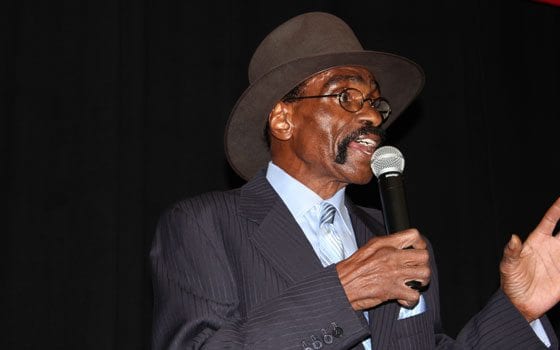
After spending 20 years in prison for crimes he never committed, Rubin “Hurricane” Carter understands the importance of never giving up.
The former middleweight boxer was just one fight away from becoming champion of the world. That ended when New Jersey state police charged him with triple murder in 1966.
Despite his ardent assertions of innocence and overwhelming evidence to confirm it, Carter was found guilty and sentenced to three lifetimes in prison. He only narrowly escaped the electric chair.
But even in the face of flagrant injustice and seeming hopelessness, Carter never gave up. For decades he passionately fought against his wrongful conviction, and refused to allow prison to erode his character. Twenty torturous years later, a federal judge overturned his conviction, and he walked out of prison a free man — and a better man.
Last month, Carter, now 74 years old, spoke before a packed auditorium at Bunker Hill Community College to share some of the lessons he learned in prison. At once inspiring, funny and somber, the former boxer moved the audience to both laughter and tears during the one-hour lecture.
“You must dare to dream,” he began, “because without the dream, nothing is going to be different than what it is now.” Dreams become aims, he explained, and “only with a permanent aim can anything be accomplished.”
“After you dare to dream,” he continued, “we must then seize every opportunity that comes our way to accomplish our dream. Seizing the opportunity, not letting it pass you by, is absolutely vital and necessary.”
But most importantly, “one must then go the distance,” he said, “which might be one of the most difficult things for humans to do.”
As a boxer, Carter never liked going the distance — he preferred quick knock-out punches and short three-minute rounds in the ring. But after his wrongful conviction, he suddenly found himself fighting for his life. And instead of three-minute rounds against a weaker opponent, he was facing three lifetimes and the “American so-called criminal justice system.”
It was only in prison that Carter understood what going the distance meant. “Sometimes your opponent will refuse to give up,” he said, “and you have no choice — you’ve got to go the distance.”
Carter’s wrongful conviction made waves throughout the country. Fellow boxer Muhammad Ali posted his bail. Bob Dylan immortalized his struggle in the song “Hurricane.” Later, Denzel Washington portrayed him in the film “The Hurricane.” From his prison cell, Carter penned the memoir, “The Sixteenth Round: From Number One Contender to #45472.” But for years, these efforts were to no avail. Carter launched several appeals for his conviction, only to see them denied, one after the other.
“When you really come to think about that, after spending 20 excruciating years in prison for something that you did not do, could not have possibly have done, and only narrowly escaping a state-sponsored execution,” Carter said, “When you really come to think about all of that, ladies and gentlemen, it’s a great pleasure for me to be anywhere today.”
In 1985, a federal judge overturned Carter’s conviction on the grounds that it was based on “racial prejudice” and the “withholding of evidence critical to the defense.”
Since his release, Carter has been living in Toronto, working as an advocate for the wrongfully convicted, serving as the executive director of the Canada-based Association in Defence of the Wrongfully Convicted, and now, the CEO of Innocence International. He also received two honorary doctorates of law, one from York University in Toronto, and the other from Griffith University in Brisbane, Australia.
“There’s no social emotion more prevalent than that of personal powerlessness,” he warned the crowd. But his story, he explained, proves that anything is possible.
In the lecture hall Carter smiled, opened a suitcase, pulled out a green championship belt, and proudly raised it above his head. Several years earlier, the World Boxing Council had awarded Carter with a world championship belt — a fulfillment of the dream he thought was gone.
“Never give up,” Carter said to close his talk. “Never, because when you give up on anything … you’re not giving up on that thing that you think you’re giving up on. You’re giving up on yourself.”






